 |
|
Grover Cleveland has the distinction of being
the only president to win reelection after having
been first turned down for reelection by the
voters. [1893
inaugural address] [ The Grover Cleveland March (1892)] The Grover Cleveland March (1892)]
Race & Gender Issues
In his opposition to temperance, Cleveland won the support
of the Irish, German, and eastern European voters who
migrated to the U.S. by the tens of thousands in the
1880s. Cleveland was inconsistent in his attitude toward
race issues, however. Although he spoke out against
injustices being perpetuated toward the Chinese in the
West, he agreed with the South's reluctance to treat
African Americans as equals socially or politically.
He felt that Native Americans should be assimilated
into white society as quickly as possible, through paternalistic
education and land grants. Finally, though he was careful
not to alienate women by speaking out against women's
suffrage, he never supported women's right to vote. |
|
|
|
Issue: The Economy
Cleveland won the election of 1892 in part by
blaming Harrison for the downturn in the economy.
By February 1893, the economy was in a depression.
Seventy-four railroads and six hundred banks
failed that year. The Wall Street investor was hit hard as the stock market lost 35% of its value. Additionally, 15,000 businesses failed and unemployment hit 20%. The already indebted farmer has also hit hard, as low crop prices fell even further. When the price of silver dropped,
there was a rush to redeem the declining silver
certificates for gold, touching off a run on
the U.S. treasury. Meanwhile, thousands of Midwestern
workers known as "Coxey's Army" tramped
toward Washington to demand government action
to relieve the economic hardships of war veterans
and the unemployed, which Cleveland declined
to give.
The economic hardships of the day brought about one of the most
violent labor disputes in the country's history,
the Pullman Strike of 1894. Following a 30%
cut in wages, the workers of the Pullman Palace |
|
Car Company went on strike, under the leadership
of the president of the American Railway Union,
Eugene V. Debs. Cleveland used the excuse that
the strike disrupted delivery of federal mail
services in and out of Chicago to obtain a court
order restoring the mail service, to be enforced
by the U.S. Army. US Marshals and 12,000 troops,
commanded by Nelson Miles went in to enforce
the order, resulting in massive outbreaks of
violence. During the course of the strike, 13
strikers were killed and 57 were wounded. An
estimated 6,000 rail workers did $340,000 worth
of property damage.
Cleveland called for a special session
of congress and the repeal of the 1890 Sherman
Silver Purchase Act in favor of the gold standard, but a shortage of gold forced the government to issues bonds, most of which were purchased by New York bankers. Cleveland was attacked for this as having sold the country to wealthy business interests. Cleveland's reputation among populist voters was salvaged temporarily when a new tariff bill was introduced in the House that included an income tax of 2% on incomes over $4,000 annually. The version of the bill produced by the Senate was drastically different. The Wilson-Gorman Bill included 630 amendments, one of which gave the sugar industry an annual windfall of $20 million. The tariff rate fell only from 48% to $41%, much less than the President had requested. Cleveland denounced his own party's politics as "party perfidy and party dishonor," but it did reduce the tariff, and so he let the bill become law without signing it. In this political atmosphere the Democrats were hammered in the 1894 midterm elections, resulting in a 244 to 105 Republican majority in the House. Republicans soon began boasting about their prospects in the 1896 elections.
Adding to the Democrat's woes were three significant Supreme Court rulings all handed down in 1895. The only part of the 1894 Wilson-Gorman tariff bill that was popular with the masses, the income tax on the wealthy, was struck by a 5-4 vote as being unconstitutional. The court also ruled that the American Sugar Refining Company, which controlled 98% of sugar refineries in the United States, was not in violation of the Sherman Antitrust Act. Finally, the court refused to grant a writ of habeas corpus to Eugene Debs, president of the American Railway Union, who had been arrested for participating in the Pullman Strike. Debs had challenged the legality of the federal injunction that had forced an end to the strike, but lost in a unanimous decision. This decision cleared the way for the federal government to continue using injunctions to end strikes. |
| |
Foreign Policy
Cleveland's foreign policy emphasized opposition
to territorial expansion and entangling alliances.
His behavior was inconsistent, however, and he took a
dangerous position when a dispute arose with Germany
over Samoa. He took a similar strategy with respect
to Hawaii, where he felt U.S. sugar planters had conspired
in the Hawaiian revolution. His most controversial action
was his interference in a boundary dispute between Venezuela
and Great Britain; believing that the English were violating
the Monroe Doctrine, Cleveland actually threatened war
against England. While historians continue to debate
his stance, the affair brought the Monroe
Doctrine back to life as the basis of U.S. foreign
policy in South America. |
| |
|
|
| |
Legacy
Cleveland did not see himself as an activist president
with his own agenda to pursue, but rather as a guardian
or watchdog of Congress. While several important pieces
of legislation were passed during his terms, most notably
legislation controlling the railroads and legislation
distributing land to Native Americans, Cleveland was
not the initiator of any of them. Cleveland will be
remembered for protecting the power and autonomy of
the executive branch by refusing to cooperate with Congress
in fights over presidential appointments. His record-breaking
use of the presidential veto as the "guardian president"
enabled him to establish equilibrium between the executive
and legislative branches. Hard-working, honest, and
independent, Cleveland nevertheless had no real vision
for the future; at most historians tend to see his presidency
as a preface to the emergence of the modern presidency
that began with William McKinley and Theodore Roosevelt. |
| |
|

c.1892 Grover Cleveland Valentine Sticker
|
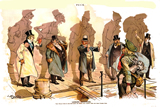
"Looking Backward," Puck, January 11, 1893, by Joseph Keppler |
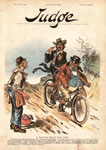
"A Bicycle Built For Two," Judge, January 27, 1894, by Victor Gillam |

"Looking Forward," Judge, May 26, 1894, by Grant Hamilton |
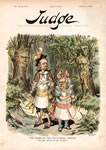
"The Babes In The Senatorial Woods," Judge, June 2, 1894, by Victor Gillam |
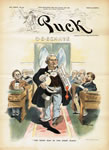
"The Right Man at The Right Place," Puck, January 23, 1895, artist unknown |
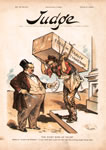
"The Right Kind of Relief," Judge, September 9, 1895, by Victor Gillam |
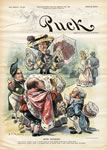
"Both Satisfied," Puck, September 18, 1895, by F.M. Hutchins |
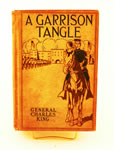
Children's Book, A Garrison Tangle, 1896, by General Charles King |
|
|
|

|
|
|
|
|
|
|
|
|
|

